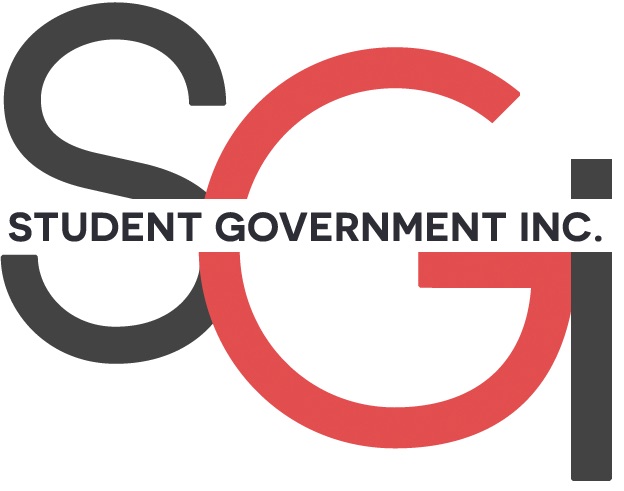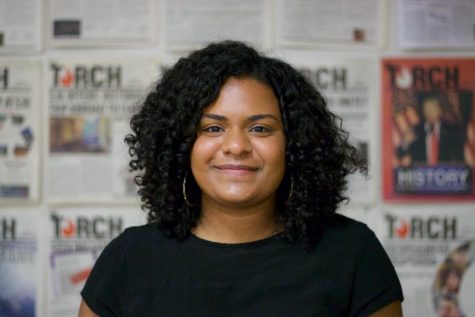While SGi elections are normally accompanied by an in-person debate moderated by the Torch’s Editor-in-Chief, this year a virtual debate took place on Instagram. We asked the H.E.A.T. ticket, D.R.E.A.M. ticket and independent presidential candidate Michael Outlaw several questions about their plans for the school year if elected. Here’s what they said:
Click here to watch the full debate videos on our Instagram!
WHY THE STUDENT BODY CAN RELY ON THEM
H.E.A.T. – They plan to earn the trust of the student body through action. “We want to meet you at your own terms because we believe that’s the only way we’ll build a true trustworthy relationship between us,” Amy Ackel, candidate for treasurer, said.
D.R.E.A.M. – They plan on being reliable, managing commitments and seeing what is in the best interest for students. “When you have years and a track record of building relationships with departments and students and divisions and even your peers that allows for trust to grow,” Presidential candidate Ariel Laura Metayer said.
Michael Outlaw – “I’m real and I’m honest,” Outlaw said. He says that he will advocate for student interests to St. John’s administration to improve student life and the St. John’s community.
HOW THEY’LL INCREASE TRANSPARENCY
H.E.A.T. – Candidate for secretary Natasha Yangthito says that as a member of the outgoing e-board, she does not think SGi worked hard enough to be transparent. The ticket plans to send campus-wide emails with updates for the student body, as well as welcoming students to assembly meetings and meetings between SGi and St. John’s administration.
D.R.E.A.M. – They will be transparent in the decisions that they make by including students in them. “We want to make sure we take you on that journey with us,” Metayer said.
Michael Outlaw – Some of Outlaw’s plans include that each e-board member give their own bi-monthly update to students on future plans and changes, conducting surveys with the Research and Development committee and changing the location of the SGi office so that it is more accessible to students.
HOW THEY’LL HELP STUDENTS AFTER COVID-19
H.E.A.T. – They plan to get incoming students involved with SGi early on in the semester. “This allows them to have the opportunity to have their voice being heard through the representatives for the rest of the fall semester and the spring semester, getting them acclimated to the school,” candidate for sophomore senator, Ethan Burrell, said.
D.R.E.A.M. – They will use social media platforms, such as Instagram and Youtube, to connect with the incoming student body in a “personalized” way, according to sophomore senator candidate Samantha Lanza.
Michael Outlaw – Outlaw plans on working with Campus Activities, Student Development and on-campus organizations to create a week of events that will welcome both new and returning students so that they feel welcome and comfortable.
WHAT THEY’LL DO DIFFERENTLY FROM PAST E-BOARDS
H.E.A.T. – They plan on creating structural changes within SGi to focus more on advocacy than previous e-boards. “We’re also coming in with big plans to change the structure of SGi that way the work we do for student advocacy this year doesn’t end with us,” presidential candidate Patrick Kohn said.
D.R.E.A.M. – They plan to increase communication with the student body by “recognizing the importance of how we communicate with our fellow students,” candidate for secretary, Phoenix Totesau-Johnson, said.
Michael Outlaw – During his time as a sophomore senator, he learned about “persistence” through his experience in the creation of the Equity Committee, which was established to address diversity issues at St. John’s. He plans to implement this same level of persistence to relationships with outside vendors and by making sure someone is always in the office to talk to students to keep the lines of communication open.
HOW THEY’LL HOLD SGi ACCOUNTABLE
H.E.A.T. – Candidate for junior senator Chris Bernabe said that the members of the H.E.A.T. ticket plan to keep one another accountable by keeping communication consistent. “Being an e-board is a huge responsibility, and in order to do our jobs efficiently, checking in with each other … is the best way to hold each other accountable.”
D.R.E.A.M. – They plan to do this in four ways – participating, so as to encourage the entire community to participate; expressing concerns; listening to make sure that these concerns are addressed appropriately and informing the community. “That produces accountability on all spectrums,” Metayer said.
Michael Outlaw – He will “promote and provide” outlets to students to ensure that the student body is kept up to date. This will take the form in weekly e-board meetings and campus dialogues, where students can communicate and critique.
HOW THEY’LL ADDRESS WELLNESS ON CAMPUS
H.E.A.T. – This will be done by collaborating with various University departments including the IRC, the SOAR office, the University Counseling Center (UCC) and the Office of Multicultural Affairs, among others, to ensure students feel “safe and comfortable” on campus, according to Yangthito.
D.R.E.A.M. – Junior senator candidate Cherokeesun Goodson says the D.R.E.A.M ticket seeks to work closely with the UCC to increase its visibility, as well as address the obstacles students face when attempting to access mental health services on campus.
Michael Outlaw – “There’s been a lack of promotion of resources,” Outlaw said. He plans to promote resources such as the UCC or SOAR office, as well as meeting with administration to strengthen these resources.
HOW THEY’LL ENCOURAGE STUDENT BODY TO ATTEND GENERAL BODY MEETINGS
H.E.A.T. – ”Anyone who’s been to SGi assembly meetings knows that there’s a lot of functional things that SGi needs to get done at those meetings and this isn’t the best place for either of those things to happen,” Kohn said. They plan to have other initiatives to promote campus dialogue such as emails, updates on their Instagram page and forums where students can discuss any issues on a regular basis.
D.R.E.A.M. – Vice presidential candidate Carley Germain discussed encouraging the student body to attend SGi meetings by using social media platforms to advertise them, and livestreaming the meetings for students to watch if they cannot attend. They also plan on changing the location of these meetings.
Michael Outlaw – He will promote these meetings to students in the form of flyers, website updates and on social media, so that students are aware that these meetings are happening and that they are welcome to attend.
HOW THEY’LL ADDRESS CONCERNS ABOUT INCREASED BUDGET FOR PANHELLENIC ORGS
H.E.A.T. – Ackel discussed the possible lack of understanding that contributed to objections to the past year’s budget. She plans to work with the budget committee to come up with a brochure that has basic information about what the budget is, who can use it and how they can use it. “Hopefully this will alleviate any misconceptions that anyone has,” Ackel said.
D.R.E.A.M. – Candidate for treasurer, Andres Mercado, addressed the confusion students may have regarding what the budget increase is for and if it is necessary. “This should be addressed because there should be transparency within SGi,” Mercado said.
HOW THEY’LL HANDLE AND RESPOND TO CRITICISM
H.E.A.T. – They plan to address any criticism publicly to express what they will do to make it better. “We’re going to be accountable by being transparent with everything that we’re doing, that way if people have criticism and they’d like to make a recommendation they can do so and easily reach out to us that way we can take it into account and change what we’re doing” Kohn said.
D.R.E.A.M. – Metayer says that criticism will help them move forward “securely and strategically.” In order to combat distrust, she plans to build a solid relationship with the student body by seeking feedback and setting micro-goals within the e-board.
Michael Outlaw – “I would not be in the position I am in without criticism,” he said. He hopes to encourage every student to tell him what he can do better at every avenue.
HOW THEY’LL CREATE AN OPEN RELATIONSHIP WITH STUDENT BODY
H.E.A.T. – They plan to have scheduled forums throughout the year, with some forums set aside for specific topics, such as public safety, where students can discuss any experiences or issues they have. They also plan to work closely with other departments such as IRC, SOAR and Public Safety, and to open these department meetings to organization members and other students.
D.R.E.A.M. – They will encourage an open line of communication not only in meetings or during office hours, but also on an online platform for those who do not feel comfortable addressing issues in person. This would occur through Google Forms or anonymous Survey Monkeys. They also plan on checking in with organizations.
HOW THEY’RE GOING TO GIVE SENIORS A GREAT YEAR
H.E.A.T. – They plan to partner with Career Services to host networking events and seminars for seniors. They are also considering a senior week in the fall and will advertise the senior scholarship to juniors, so that they’re aware and can apply for it their senior year.
D.R.E.A.M. – Candidate for junior senator, Cherokeesun Goodson wants to focus on career preparedness for juniors so that students feel “supported and confident” about their futures going into senior year. “You wanna enter your fall semester of senior year feeling like you have it together,” Goodson said. This would include panels with professionals and working with career services.
HOW THEY’LL HELP FIRST AND SECOND YEAR STUDENTS ACCLIMATE
H.E.A.T. – They want to make sure that first and second year students are implemented into chair positions and other capacities within student government so their ideas can be heard and executed. They also will consider having a commuter committee, where commuters concerns and ideas can be addressed.
D.R.E.A.M. – They will help first and second year students by partnering with the University Learning Center and Career Services to help students be successful. Lanza plans to create a welcome package for incoming students with helpful information about textbooks, commuting and meal plans.
HOW THEY’LL AID SENIORS IN CAREER READINESS
H.E.A.T. – Senior senator candidate Jamie Selletti plans to hold numerous alumni panels throughout the year, specifically targeting the different colleges within St. John’s. These events would be an opportunity for seniors to network with alumni in their desired career path outside of career fairs. They also hope to work with Career Services to have advisors block out specific appointment times throughout the year designated for seniors, for walk-ins and career readiness.
D.R.E.A.M. – Senior senator candidate Caitlin Cassidy plans on utilizing alumni to hold conferences, networking events and mentorship programs. Collaborating with Career Services to hold career readiness events such as resume peers, editing, small business showcase, free professional headshots and business card workshops are also part of the plan.
HOW THEY’LL MAKE SENIORS AWARE OF THE SENIOR SCHOLARSHIP
H.E.A.T. – They will partner with Internal Communications to make sure an email is sent out campus-wide to all seniors so that they are aware of the opportunity, and they also plan on using social media to reach out to organizations so that they can make their senior members aware of the scholarship.
D.R.E.A.M. – “As of right now if you go on the St. John’s website and search ‘senior scholarship,’ the only thing that comes up is ‘this form is now closed.’ That should be the first thing that’s changed – there should be a detailed description of what it is, how to apply, who’s eligible and how the process works,” Cassidy said. They plan to promote the scholarship through flyers around campus, in the Financial Aid office and on the SGi website. They also plan to have a text message system similar to that of Public Safety to send out text updates.
HOW THEY’LL IMPROVE THE CAMPUS COMMUNITY
H.E.A.T. – They plan to have open meetings with campus departments where students are welcome to attend and give their input directly to these parties. They will also be changing organization standards, implementing mandatory service hours and inclusivity training at the IRC, among other efforts to promote inclusivity. “The SGi e-board is supposed to be the loudest, most productive tool that students can use to confront administration or campus departments,” vice presidential candidate Julia Betancourt said. “It has to be vocal in its work to actively combat exclusivity or systemic issues going on within campus.”
D.R.E.A.M. – They plan to improve the SGi website so that it can be a bigger resource for the community. It would include their goals, duties, how to reach them and resources on campus. “I think it’s important that we let people have one easy way to really gain access to all this information so that it’s not overwhelming and it comes from the people that are supposed to help them and serve them,” Totesau-Johnson said.












